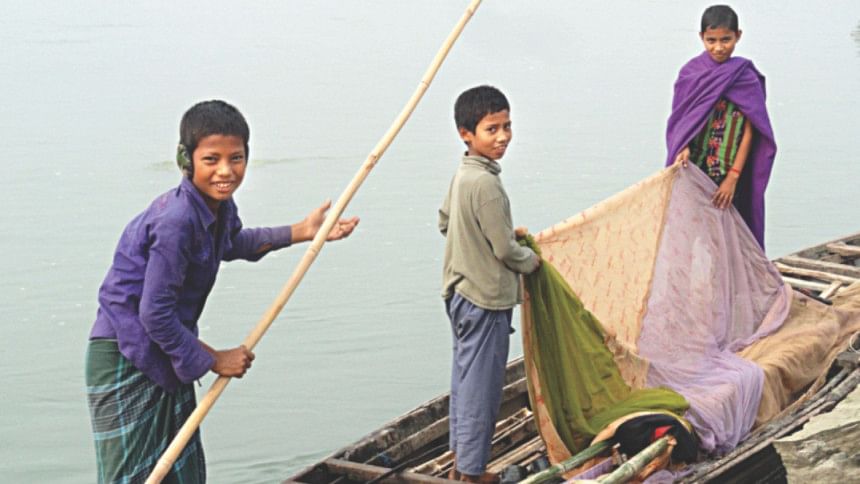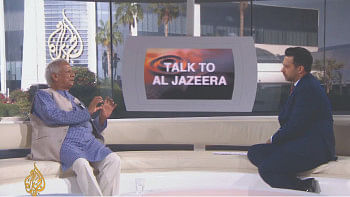No chance for school, partners in fishing

The ideal childhood: carefree, with supportive family, and about the only matter deserving full concentration being schoolwork. Sadly, the ideal childhood is still a far cry from the reality experienced by many Bangladeshi children.
In remote Char Falimari village, set on a river shoal in Lalmonirhat Sadar upazila, three eleven-year-olds, Mizan Islam, Sohel Rana and Delowar Hossain don't go to school. Their families can't afford to send them. But despite the absence of ideal circumstances, the three decided to make the most of their situation. They've formed an informal, three-member fishing cooperative; collectively they earn a daily income to contribute to each of their struggling families.
“I was admitted in a primary school,” says Mizan, “but I had to say farewell to my classes due to our family's poverty. I still dream of studying but it's not possible for me.”
Three years ago, Mizan and his two friends, all of whom left school after class two, each collected Tk 6,000 from their families. With the Tk 18,000 they made a skiff and bought fishing nets. Nowadays they spend each day on the Dharla River catching fish together, and it's something they enjoy.
“We've been fishing since we were very young,” says Mizan, “and more recently we've become skilled at navigating the skiff in the river too.” Through fishing, the three partners each earn an income of up to Tk 300 per day.
“We leave for the river early in the morning,” says Sohel, “and arrive home again around noon. Sometimes we even go night fishing, up to seven kilometres from our village.” He notes that the three friends like working together and that all of them are happy to be earning money to help their struggling families.
“Fish traders buy our catch from the riverbank,” says Delowar, the third member of the team. “There's never a need to go to the market.”
“Among us there is no captain,” he explains, “We respect each other. We are always together, day after day.” He says the hardest part of their enterprise might be facing the cold of winter. “When out on the river of a winter morning, we really shiver.”
“It's true I didn't provide for my son to study at school due to our poverty,” says Sohel's father Nazrul Islam. “Even so, I never wanted to see him catching fish in the river. But my son's income does help to maintain our family and, as my wife is unwell, to buy the daily medicine she needs.”
Mizan's father Nur Islam likewise says he wanted his son to study. “But my son was never comfortable at school,” he says. “Now Mizan with his two partners have taken on the challenge of fishing to help alleviate our poverty, and they are doing well at it.”
The partnership has made an impression in the village. “The three of them are inspiring,” says neighbour Ashraf Ali, 48, also a fisher. “From them we can see how to live with hardship and still smile. They set an example of honesty, love and friendship. There are many children in the village but those three are exceptional.”
Understandably, local primary school teacher Sufia Begum is less impressed. “I tried several times to bring the three of them back to school but I failed,” she says. “They are determined to earn money catching fish. We do conduct door-to-door campaigns to raise awareness among guardians of the importance of sending their children to school.”
Latifur Rahman of the district's fishery office says that while his department provides input support to ancestral fishers it has no project to educate fishers' children.
For now, the three children are occupied by the river. They dream to build more skiffs and make more nets to expand their enterprise. They believe their strong partnership will bring about such future opportunity.

 For all latest news, follow The Daily Star's Google News channel.
For all latest news, follow The Daily Star's Google News channel. 



Comments